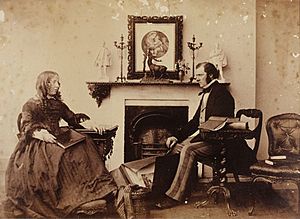Benjamin Brecknell Turner facts for kids
Benjamin Brecknell Turner (1815–1894) was one of Britain's very first photographers. He was also a founding member of the Photographic Society of London, which started in 1853. His photographs often looked like the beautiful landscape paintings made by watercolour artists before him.
Contents
Who Was Benjamin Brecknell Turner?
Benjamin Turner was born in London in 1815. He was the oldest of eight children. His family lived above their business, which made and sold candles and saddle-soaps. When Benjamin was sixteen, he started working as an apprentice for his father.
In 1837, he joined a special group called the Worshipful Company of Tallow Chandlers. A year later, in 1838, he became a Freeman of the City of London. On August 17, 1847, he married Agnes Chamberlain. Her family was famous for making Worcester China.
His Photography Journey
In 1849, Benjamin Turner got a special license from William Henry Fox Talbot. Talbot was the inventor of paper negative photography, also known as Calotype or Talbotype. Turner quickly became very skilled at this new way of taking pictures.
During the 1850s, he created many photographs and showed them in different exhibitions. He joined the Photographic Society, which later became the Royal Photographic Society. He was a member from 1854, and likely even earlier in 1853. He stayed a member until at least 1893.
The 'Photographic Views from Nature' Album
Between 1852 and 1854, Turner put together 60 of his own photographs. This collection was called 'Photographic Views from Nature'. It is thought to be a one-of-a-kind album. It might have been a sample book to show his work to friends or people who might want to display his photos.
This special album stayed with the Turner family for many years. Eventually, the Victoria and Albert Museum in London bought it. Almost a third of the photos in the album show scenes from Worcestershire. This area was important because Turner's father-in-law lived there. He had bought a large home called Bredicot Court after he retired from making porcelain.
Working in a Studio
From the mid-1850s, Benjamin Turner worked in a "glass house studio." This studio was above his business in London. He took many portraits there, but he never seemed to show them in public. While Turner is best known for his pictures of nature and buildings, he also took portraits. He often photographed his family and people from his business. For these portraits, he often used glass negatives. These negatives allowed for very short exposure times, which meant he could capture a lot of detail.
Where to See His Work
You can find Benjamin Brecknell Turner's photographs in several important museums and galleries:
- Victoria and Albert Museum
- National Gallery of Art, Department of Image Collections
- National Media Museum
- Metropolitan Museum of Art
- National Galleries of Scotland
- National Portrait Gallery
- National Gallery of Canada
 | Selma Burke |
 | Pauline Powell Burns |
 | Frederick J. Brown |
 | Robert Blackburn |


